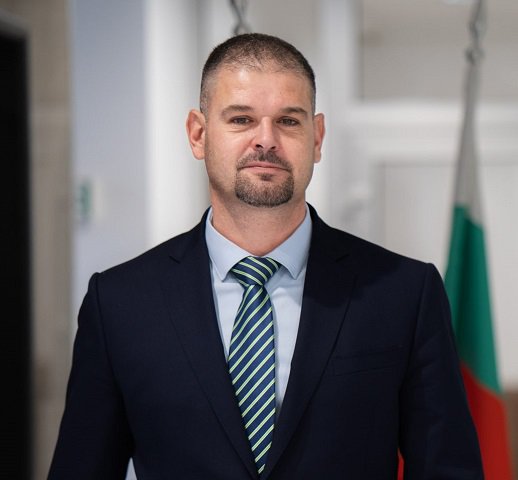
Iliya Karanikolov, Chairperson of the Management Board of BDB: BDB will position itself as a serious player in the banking market
 Mr. Karanikolov, in a time of political and economic instability, you are taking over the management of the state bank. What is your motivation for taking on this responsibility?
Mr. Karanikolov, in a time of political and economic instability, you are taking over the management of the state bank. What is your motivation for taking on this responsibility?
Managing a banking institution in an environment of instability is a serious challenge, but at the same time it is an excellent opportunity. I believe that in this period of superimposed crises BDB should validate its core mission and function laid down in the law for its establishment. We do not waste time in excuses but focus on finding solutions. I have invested a considerable part of my professional life in this institution, so I cannot stand on the sidelines and watch indifferently what is happening around it, without having tried my best to help its development.
You know BDB well, you were a member of the Management Board and Executive Director in 2011-2013, and for the last 3 years you have been the Head of the Financial Instruments Department. What path has the lending institution taken for the last 10 years? What is the current state of the bank?
In short – rise and fall. In 2011-2013, BDB was a bridge between business and development. We implemented very successful lending programmes and the first national guarantee schemes. Then the bank seemed to lose its way a bit, leading to criticism, including calls for its closure. All countries in Europe strongly support and develop their encouragement banks as a tool to support national priorities, sectors, and strategies. The latest countries that have recently established development banks are Romania and Greece.
How will you overcome the voices of criticism? Will you find the path that you have lost?
BDB is undoubtedly one of the most stable financial institutions in our country. It is no coincidence that it was approved as a managing partner by the European Commission under the InvestEU Programme – one of the serious successes for our team. By the middle of the year, it is expected that we will provide guarantees in favor of Bulgarian companies in the amount of over BGN 2 billion. We are about to finalize our guarantee agreement with two of the most influential European banks – the European Investment Bank and the Council of Europe Development Bank. Thus, another BGN 700 million will be mobilized to support businesses.
The team of professionals at BDB has taken important steps to return to its original functions and priorities. It is very important to stabilize the information environment around the bank, so that our foreign partners continue to have confidence that their funds in Bulgaria are managed responsibly.
To what extent does the imposed limit of BGN 5 million affect the results of BDB's lending activities? What was the average loan amount before and what is it now? Furthermore, please compare the number of loans granted.
A threshold of BGN 5 million cannot help but hinder the business of a bank. At the moment, however, the limit seems reasonable. The average amount of direct loans granted is well below this threshold. I am confident that the period of large loans is definitely behind us. With a very clear mandate from the government – on a specific occasion or a support programme, a reasonable amount of restrictions will obviously be considered, if at all necessary, in line with the tasks set for the bank to solve.
What is the interest in BDB from small and medium-sized businesses?
BDB's role is to be a partner to entrepreneurship and the banking sector, without profit maximization, not only in the form of direct lending for companies but also through good cooperation with commercial banks. A few days ago, we signed our 11th guarantee agreement with UniCredit Bulbank, with which we will help another BGN 200 million to reach Bulgarian businesses. It won't make an impression on you in the mainstream, but it's just one of the many forms of business support that BDB provides to bridge the gap between supply and demand.
Very soon, I expect interest in our direct lending to increase, as the bank is yet to come out with new products for specific market niches. Our vision is for BDB to position itself as a partner in terms of green financing – this is also within the framework of our agreement with the European Investment Bank. So I expect our portfolio of green investments to grow significantly very soon.
Development banks provide guarantees and security to other market participants and also act as a buffer in case of crises. Is BDB doing well in this role and what are your plans for its development?
The bank has always been active in times of crises. In 2010, we made a programme for the assignment of receivables from the budget, with which 1,236 assignments were carried out with a total value of BGN 365 million. The assigned liabilities belonged to the Ministry of Finance, the Ministry of Environment and Water and to municipalities.
The programme provided funding under fiscal constraints, with businesses willing to participate receiving payments from BDB in 2010.
In 2012, the first risk sharing schemes with commercial banks were prepared. Thanks to BDB, the interest on business loans was significantly reduced. The bank literally saved BGN 240 million from being lost under a European programme by developing the first national guarantee scheme. It implemented two successful anti-crisis COVID programmes. At the right moment, more than BGN 190 million reached the affected workers and employees in the form of interest-free loans. Over BGN 630 million was the amount of guaranteed loans to Bulgarian companies.
I am confident that now is the time to seek synergy between the European funds under the Recovery and Sustainability Plan and the resources of the national development bank, which the new team and I are already working on.
Are you clear with which programme you will start?
BDB will use its know-how to support businesses so that the funds from the Plan flow into the economy. One good option is so-called bridge financing: if a company applies for a grant programme, it needs funds to start the implementation of its project. Many businesses find it difficult to provide this resource until they receive the grant funds.
We are already looking at the possibility of providing bridge financing for small photovoltaic plants. We will try to support also households looking for initial financing of the costs of building solar plants, for which they will subsequently receive a grant.
What will you focus on in managing the bank?
I'll paraphrase a popular thought by Richard Branson: "Business is a vehicle for positive change in the world." I believe in this, adding that banks, in their role as an indispensable partner, participate in this change, including by committing themselves to solving social and environmental problems.
Development banks around the world play an essential role in implementing government strategies for economic stability and growth. BDB has the opportunity and knowledge to position itself as a serious and respectable player on the banking market, a sought-after partner with whom both Bulgarian and foreign financial institutions are ready to interact in support of Bulgarian business.
Part of our current agenda is to first do the necessary, then the possible, and finally the currently impossible to become a reality. The tasks are many, the opportunities and tools are also many, but the goal is one – the creation of an accessible environment for financial support of small and medium-sized businesses.
Biography:
Iliya Karanikolov is the new Chairperson of the Management Board and Executive Director of BDB. He is well-known to the bank, as he was part of its management in the period 2011-2013. He has over 20 years of banking and financial experience and he has also been part of the Postbank team.
His professional biography goes through the ministries of Economy and Energy and Labor and Social Policy, as well as through the Fund of Funds as Chairman of the Supervisory Board, Deputy Chairperson of the Management Board and Executive Director. Mr. Karanikolov has broad expertise in the fields of public administration, European integration, EU strategies and programmes.
Source:"Banker"newspaper
